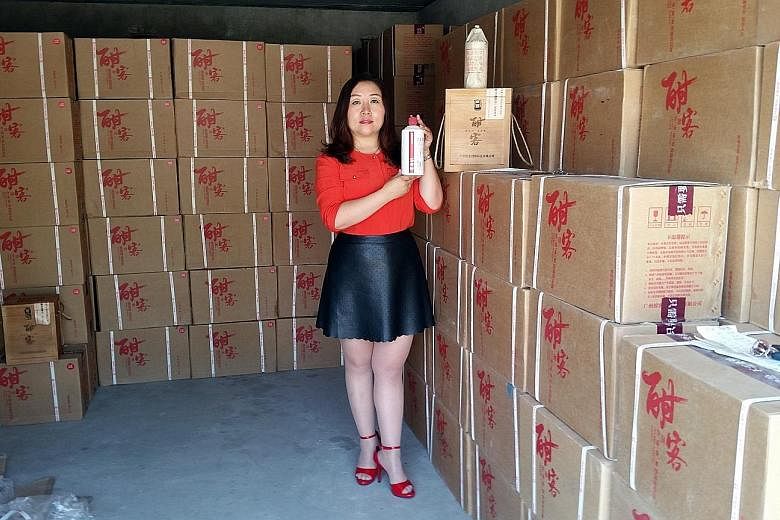Baijiu is a must-have for many businessmen meeting over a meal in China.
But until recently, businesswoman Wei Haixia, 40, had deemed the traditional distilled spirit overpriced and harmful to health.
Then in February, she bought 2,400 bottles of baijiu at a discounted price of 480,000 yuan (S$98,000), after learning that baijiu, which literally means "white liquor", can appreciate in price as its flavours evolve, just like red wine.
Ms Wei bought them from Hanke, a baijiu maker in central Guizhou's Maotai town, which is home to Kweichow Moutai, arguably China's best-known baijiu producer.
"We used to think the more expensive the liquor is or the higher its alcohol content, the better it is. But now, I know it can be good for health and doesn't have to cost a bomb," Ms Wei, 40, told The Sunday Times.
"Now, I drink it every night with my family and give it away as gifts to my friends," added the Beijing resident, who runs a mining equipment business.
New-found fans like Ms Wei are why baijiu makers are in high spirits again after sales suffered as a result of President Xi Jinping's anti-corruption and frugality drives launched in late 2012.
State-owned enterprises, government agencies and the military, which once accounted for 50 per cent of baijiu consumption, had to toe the line by cutting orders. Presenting officials with baijiu as a gift also fell out of favour, causing demand to weaken.
The first quarter of this year saw a 16 per cent rise in baijiu sales, the first double-digit growth since 2012.
Producers have raised prices this year, reversing the "deep discounts" trend of the past three years.
As a result, shares of Kweichow Moutai, one of China's top producers of high-end baijiu, have risen 27 per cent this year, almost three times from its low in January 2014.
Analysts say baijiu makers are benefiting from their efforts of targeting private enterprises and individual consumers, which combine to make up over 95 per cent of demand. Government clients now account for less than 5 per cent.
By introducing more fashionable packaging and new flavours, makers are changing perceptions of baijiu as an ostentatious symbol of wealth or a tool to obtain political favours .
The strong smell and flavour of baijiu, which is usually drunk straight, have led to it being described as "firewater" and likened to fuel, stinky cheese and even sweaty socks.
By lowering the price and alcohol content of their baijiu, some companies have managed to attract consumers in their 30s and below, said analyst Tan Xiaolong of Zero Power Intelligence market consultancy.
"The recovery is not because of a scale-back in the anti-corruption campaign, but because of the repositioning efforts by baijiu firms. The low to middle-range market has become the new growth driver," Mr Tan told The Sunday Times.
New sales tactics have also helped to attract younger consumers. The Hanke baijiu, for instance, uses social networking platforms such as WeChat to reach out to this group by informing them of health benefits, such as improving immunity and blood circulation.
Mr Chen Xi, 52, a wholesaler of Hanke baijiu in Inner Mongolia's Chifeng city, is seeing results.
"Those born in the 1970s make up 50 per cent of my clientele, while those born in the 1980s now account for 10 per cent, but they are showing strong growth potential," he said.
Analysts say China's baijiu makers, who could afford to neglect the overseas market in the past because of strong domestic demand, are also benefiting from their foreign forays.
With baijiu bars coming up in cities like London and New York, young people in China associate drinking baijiu as a cool thing to do.
Mostly distilled from sorghum, though other grains may be used, baijiu accounts for 55 per cent of China's US$40 billion (S$54 billion) liquor market. It is, in fact, the best-selling spirit in the world.
Analysts believe prospects will become brighter if some challenges can be overcome.
Mr Huang Wei, chief analyst for the food and beverage sector at Citic Securities brokerage, said there is a latent demand for baijiu as it is seen as a hospitality must-have in China.
"It is not easy to ascertain the price of dishes but the choice of liquor usually reflects the degree of regard a host has for his guests," he told The Sunday Times.
In going global, baijiu - which has a 5,000-year history - faces stiff competition from other drinks such as beer and wine, which have a lower alcohol content and are more palatable to younger consumers, said Mr Tan.
"The taste is the biggest barrier to baijiu becoming a globally popular drink. The key lies in lowering prices and alcohol content, introducing new flavours, and emphasising its health benefits," he added. •Additional reporting by Lina Miao

